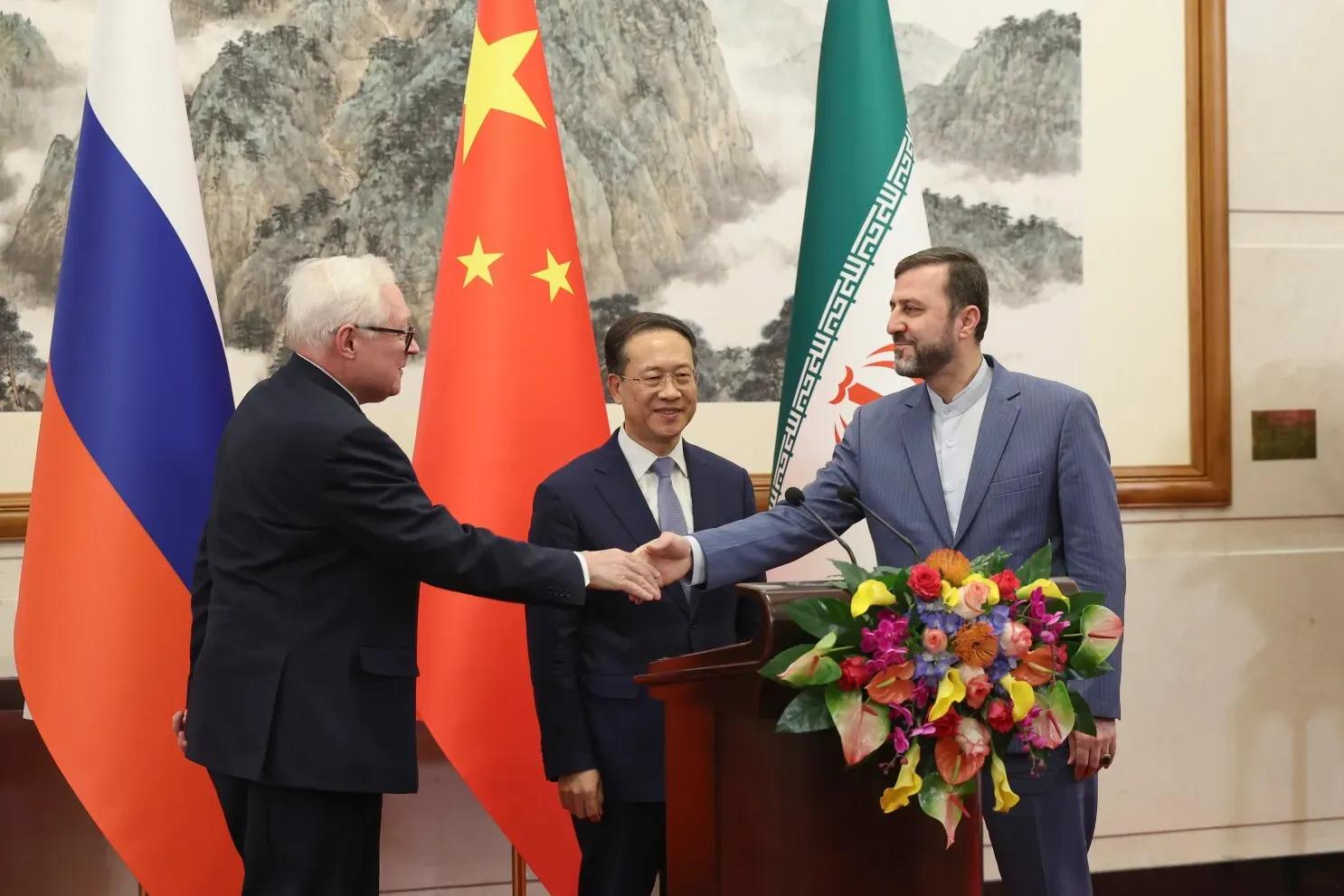The image reflects the Russian Deputy Foreign Minister, Sergei Ryabkov (on the left), Chinese Foreign Minister Wang Yi (in the center), and Iranian Deputy Foreign Minister Kazem Gharibabadi (on the right) gathered in Tehran, Iran.
Within the framework of the nuclear meeting held in Tehran, Iran discussed on Tuesday, the 22nd, the Tehran nuclear program and the risk of renewed sanctions by the United States. The meeting took place before the resumption of nuclear talks with the E3 (the European nuclear nations) which include France, Germany, and the United Kingdom in Istanbul, Turkey, next Friday, the 25th.
Let us remember that the three European powers, along with China and Russia, are the parties to the 2015 nuclear agreement that lifted sanctions on Iran in exchange for restrictions on its nuclear program, backed at that time by former US President Barack Obama, and that agreement began to unravel in 2018 when Donald Trump decided to withdraw from it and sanctions against Iran were reinstated.
Since then, Iran has gradually increased its nuclear activities, including uranium enrichment to 60%, coming close to the materials suitable for nuclear weapons or uranium enrichment at 90%. Here, not only the United States acted, but European nations did so as well through the application of the "Snapback" mechanism provided in the 2015 agreement. This is a legal mechanism stipulated in the United Nations sanctions system, allowing the re-imposition of sanctions if Iran violates the 2015 nuclear agreement.
France, Germany, and the United Kingdom have warned of their actions if there are no advances in the meeting in Istanbul from the 25th until the end of August, but the Iranian Foreign Ministry spokesperson, Esmail Baghaei, stated that Iran continuously coordinates with China and Russia on ways to avoid withdrawal or mitigate the consequences. Tensions had begun on Sunday when Iranian Foreign Minister Abbas Araghchi expressed in a letter addressed to the UN Secretary-General, Antonio Guterres, the following: "The E3 lacks all legal, political, and moral legitimacy to invoke such mechanisms" and accused those nations of failing to meet commitments under the agreement. On the other hand, Baghaei asserted that the European nations have been guilty and negligent regarding the 2015 nuclear agreement and also stated that "Iran has no plan to engage in talks with the United States in its current situation."
The talks on Friday in Turkey will be the first since the ceasefire of the twelve-day conflict waged by Israel against Iran in June, during which the United States also attacked three critical Iranian nuclear facilities, resulting in the deaths of 1100 people in Iran, including military personnel and nuclear scientists, while 28 civilians died in Israel.
The meeting today in Tehran between China, Russia, and Iran makes it clear that the latter will enter the negotiation tables in Istanbul next Friday and that this trilateral relationship was not only a political backing for what is to come on Friday, but a reminder of how strategic alliances are configured in times of global uncertainty, knowing that we have a global scenario plagued by sanctions, wars arising from distrust, and prolonged tensions among nations. Here, Iran seeks support that allows it to negotiate without renouncing its sovereignty, while China and Russia seize this opportunity to consolidate their influence in the Middle East and reaffirm their questioning of the international order led by the West.
The meeting in Tehran not only aligns the positions among three key actors before a new round of dialogues but also sends an unequivocal signal to European nations, where any negotiated exit regarding nuclear materials must count on the acquiescence and interests of this Eurasian bloc or risk deepening the fracture in the existing non-proliferation architecture, as the Tehran meeting today presents an uncomfortable truth for Europe and the United States for lacking a broader, realistic, and inclusive approach, and under any circumstances, at most it will be temporary.

Comments